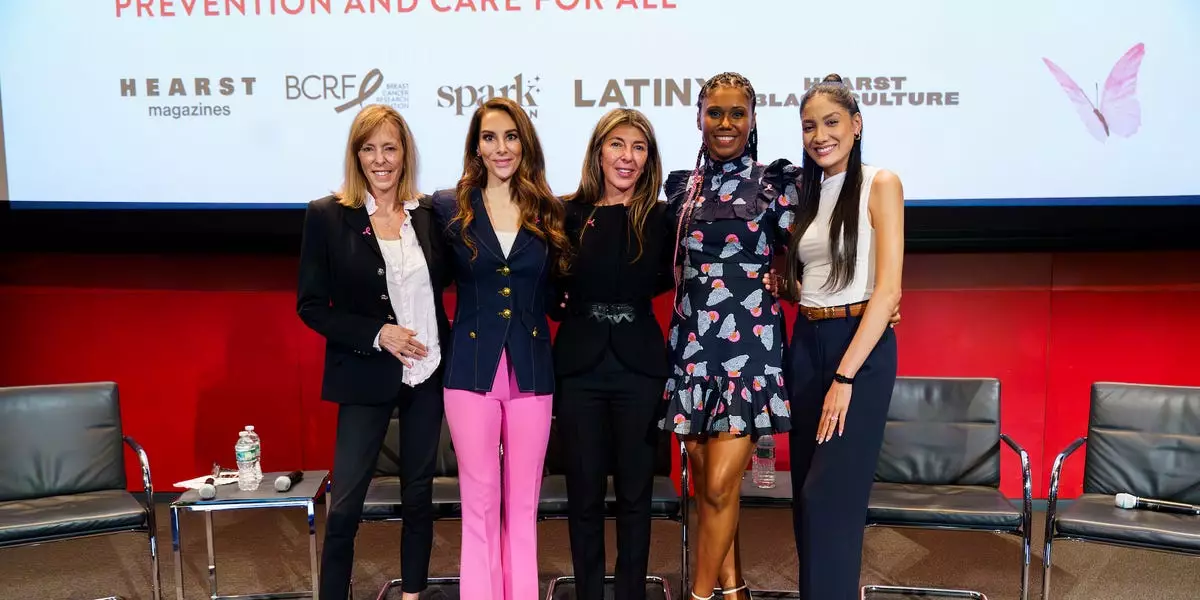October marks Breast Cancer Awareness Month, a critical time to shed light on a disease that impacts millions of lives every year. In collaboration with the Breast Cancer Research Foundation (BCRF), Hearst hosted a panel discussion titled “United Against Breast Cancer: Prevention and Care for All.” This enlightening event featured a compelling dialogue among four remarkable women: Nina Garcia, prominent editor-in-chief of ELLE and board member of BCRF, actress Toks Olagundoye, advocate Rebecca Porter, and the breast cancer expert Dr. Elizabeth Comen. Moderated by Lucy Kaylin, Hearst Magazines’ editorial director, the conversation centered on the startling realities of breast cancer, particularly its disproportionate impact on women of color.
The panelists opened with somber statistics regarding breast cancer mortality rates, emphasizing that Black women are 40% more likely to die from breast cancer compared to their white counterparts. Even more concerning is that women of Hispanic heritage often encounter breast cancer at younger ages and exhibit higher rates of the BRCA mutations. These disparities highlight an urgent need for systemic change in how breast cancer care is delivered across different demographics.
Dr. Comen stressed that these disparities extend beyond statistics, reaching into the personal experiences of women who often feel silenced or disregarded by the healthcare system. Such neglect can lead to delayed diagnoses and, tragically, higher mortality rates. This conversation revealed an ingrained bias within medical practices that disproportionately affects women of color, stressing the necessity for healthcare professionals to actively listen to their patients.
In the discussion, self-awareness emerged as a vital tool for women in managing their breast health. Advocate Rebecca Porter shared her personal journey, emphasizing the need for women to conduct regular self-examinations. “Knowing your normal” is crucial, she noted, as it empowers women to advocate for themselves if they sense something is amiss. Dr. Comen echoed this sentiment, arguing that discouraging women from performing self-exams is detrimental, especially when they are a first line of defense in early detection.
Porter’s story particularly resonated with many in the audience. Despite her intuition suggesting something was wrong, healthcare providers dismissed her concerns due to her age and lack of family history. Her journey toward diagnosis exemplifies the hurdles many women face in seeking care and the importance of persistence and self-advocacy.
Panelists shared their personal stories of grappling with the fear and uncertainty that accompany breast cancer challenges. Nina Garcia, who opted for a preventative double mastectomy after discovering she carried the BRCA mutation, reflected on the heavy toll that her personal decisions took on her privacy. Initially reluctant to disclose her situation, Garcia found strength in vulnerability. Realizing her platform could educate and inspire others, she chose to speak out, enhancing awareness surrounding the importance of genetic testing and proactive measures.
Toks Olagundoye’s insights shed light on workplace dynamics during health crises, emphasizing the need for supportive environments. Olagundoye faced fears about job security while navigating her health challenges, but the support from her colleagues proved transformative. The trust and understanding from the production team highlighted a need for compassion and open dialogue in the workplace.
A recurring theme among the panelists was the critical role of community in the fight against breast cancer. Garcia articulated how invaluable it was to connect with women who had faced similar challenges. “Doctors can provide medical information, but the emotional support from others who have gone through it is unparalleled,” she stated. The importance of sharing experiences and building a network of support cannot be understated; it fosters resilience and creates an avenue for learning from each other’s journeys.
Moreover, the sense of community extends into family dynamics, as illustrated by Olagundoye’s experience with her husband. The illness not only transformed her perspective on health but also enriched the couple’s partnership, leading to greater equality and understanding in their relationship. This illustrates that even in moments of despair, there can be opportunities for growth and deeper connections.
The panel discussion “United Against Breast Cancer: Prevention and Care for All” served as a profound reminder of the complexities surrounding breast cancer awareness. The experiences shared by Nina Garcia, Toks Olagundoye, Rebecca Porter, and Dr. Elizabeth Comen underscore the critical need for advocacy, education, and community support in navigating this devastating disease. As we continue to honor Breast Cancer Awareness Month, it’s imperative to reflect on these insights and push for systemic changes that promote health equity, ensuring that all women receive the care and understanding they deserve. Together, we can unite in the fight against breast cancer, fostering a future where no woman faces this battle alone.

